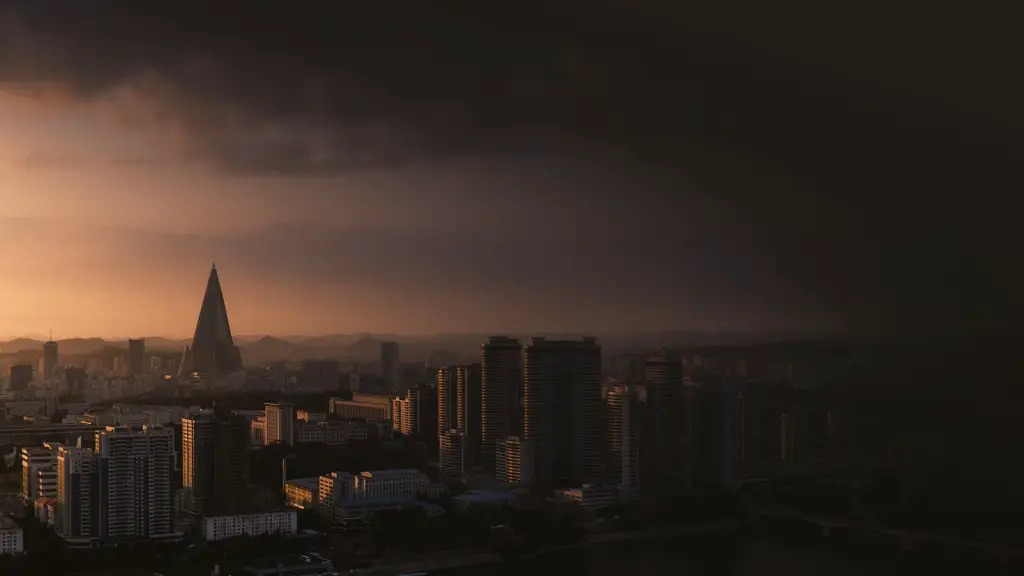Background Information
Since the end of the 1950–53 Korean War, North Korea has been the principal source of tension in East Asia. It has conducted several nuclear tests, maintained a large fleet of ballistic missiles, and continues to develop its nuclear program. For these reasons, it is a source of great concern to the United States, Japan, and South Korea. In addition, it has also been accused of alleged human rights violations. Although North Korea is a small and relatively isolated nation, it is an unpredictable and dangerous state.
Data and Statistics
North Korea’s nuclear arsenal is estimated to include 10-20 nuclear warheads, with an estimated range of over 6,000 miles. It also possesses a considerable stockpile of ballistic missiles, with a range of 500 miles. Most of these are short-range ballistic missiles, but North Korea does have a number of intercontinental ballistic missiles capable of reaching the United States. North Korea has also tested several long-range missiles, although these have yet to be fielded. In addition, North Korea has developed a range of other conventional weapons, including tanks, artillery, and tanks.
Expert Perspectives
Experts have warned that North Korea’s nuclear weapons, ballistic missiles, and conventional weapons all represent serious threats to the region. For example, Jeffrey Lewis, an arms control expert at the Middlebury Institute of International Studies in California, has said that North Korea “could, in theory, launch a surprise attack on US forces in South Korea, US forces in Japan, or US forces in Guam.” Similarly, Toby Dalton, a non-proliferation expert at the Carnegie Endowment for International Peace, has warned that “missiles armed with nuclear weapons, with their range and mobility, present an especially tough challenge to US missile defense systems and the ability to protect allies.”
Analysis
It is clear that North Korea represents a real and significant threat to the security of the region. Its nuclear weapons and ballistic missiles, as well as its conventional weapons, represent a real danger to South Korea, Japan, and the United States. In addition, the unpredictable and erratic behavior of the North Korean regime further adds to the threat it poses. Thus, it is essential that a strategy is developed to contain and ultimately reduce the threat posed by North Korea.
International Diplomacy
The international community has been working to mitigate the threat posed by North Korea for many years. In recent years, there have been a number of diplomatic initiatives aimed at containing North Korea’s nuclear ambitions. The United Nations has passed a series of resolutions condemning Pyongyang’s nuclear activities and imposing financial and trade sanctions. In addition, the United States and its allies have been holding a number of negotiations with North Korea aimed at reaching an agreement on denuclearization.
Sanctions
The international community has imposed a range of economic sanctions against North Korea in response to its nuclear program. These sanctions have been aimed at weakening the North Korean economy and depriving the regime of the resources it needs to continue its nuclear program. These sanctions have had some impact, reducing the income of the North Korean government and limiting its access to foreign currency. However, they have not been enough to force Pyongyang to abandon its pursuit of nuclear weapons.
Regional Repercussions
The heightened tensions between North Korea and the United States and its allies have had a profound impact on the region. In South Korea, public opinion is divided on how to approach the North Korean nuclear threat. Some South Koreans are concerned about the possibility of war, while others advocate for a peaceful resolution. In addition, the regional economy has been affected by the sanctions imposed on North Korea, as neighboring countries that have traditionally had close economic ties have been forced to limit their trade with North Korea.
US Strategy
The United States has taken a hard line stance regarding North Korea’s nuclear activities. President Donald Trump has threatened to unleash “fire and fury” on North Korea if it continues its pursuit of nuclear weapons. The US has also conducted a number of joint military exercises with its allies in the region to demonstrate a commitment to defending its allies in the event of an attack by North Korea. In addition, the US has sought to increase diplomatic pressure on Pyongyang and push for stronger sanctions.
Chinese Influence
China is North Korea’s closest ally and provides the country with much of its economic support. China has consistently opposed a military response to North Korea’s nuclear activities and has instead advocated for a diplomatic solution. Nonetheless, China has increased economic pressure on North Korea in recent years, most notably by signing onto UN sanctions against North Korea. Despite this, Beijing still maintains close relations with North Korea and is widely seen as the only nation with the clout necessary to bring about a peaceful resolution to the North Korean crisis.
International Cooperation
In order to truly contain the North Korean threat, it is essential that the international community works together. The UN Security Council, in particular, must play a greater role in addressing the North Korean nuclear threat. Additionally, increased international cooperation is needed to implement the various sanctions and other measures that have been agreed to. The US, Japan, and South Korea must also continue to work together and strengthen their military cooperation in order to defend against any aggression from North Korea.


